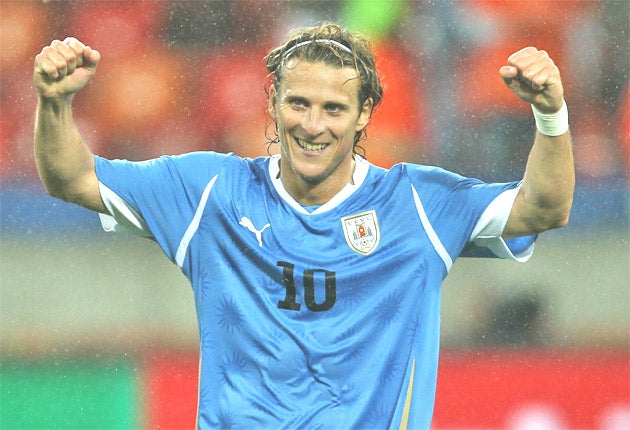Just as Tottenham are always said to prosper when a year ends in 1 so Uruguay do well in World Cups when the year finishes in a 0. They won the trophy in 1930 and 1950; reached the semi-finals in 1970 and although 1990 only saw them make it to the round of 16, where they were eliminated by hosts Italy, now in 2010 another semi-final beckons for the team that was the last to qualify for South Africa.
Uruguay have long had a reputation for spoiling other people's parties. Their 3-0 demolition of South Africa in the group stage was one of the most one-sided contests of this World Cup. The vuvuzelas howled, the atmosphere pressed down but Oscar Tabarez's trick of withdrawing Diego Forlan just behind the front two was a tactical switch Bafana Bafana never remotely came to terms with. And although the hosts were to beat France in another rugby stadium, this time in Bloemfontein, their World Cup was effectively over.
Forlan will definitely start in the same role against Ghana tomorrow since Tabarez has already announced the team for the quarter-final as he believes it stops "tiresome press speculation". Edison Cavani, linked with a move to Spurs from Palermo, and Luis Suarez, who killed off the South Koreans in the last round with one of the goals of the tournament, will spearhead the attack.
For a team that had to play off against Costa Rica to qualify, the quality of their football has been rather more sophisticated than in some World Cups, as anyone who saw Scotland's Gordon Strachan being scythed down after two minutes of their game in Mexico '86 will recall.
Sir Alex Ferguson, who was managing Scotland, described Uruguay as "a disgrace, a team with no respect for other people's dignity." A remark from the soon-to-be manager of Manchester United that might have been stirred by the frustration of being unable to break down a side reduced to 10 men for 88 minutes.
Uruguay's impact on the tournament dates back to the very start. There are still those in Montevideo old enough to remember the flotilla of boats that arrived from across the River Plate in the expectation of seeing Argentina win the first World Cup in 1930 – which had only been staged in Uruguay because they promised to pay all the other sides' travelling expenses.
Argentina lost 4-2; their star striker Luis Monti was panicked by death threats and the Uruguayan embassy in Buenos Aires was stoned. Twenty years later, Uruguay reduced 200,000, the largest crowd ever to watch a football match, to silence and tears at the Maracana Stadium in Rio de Janeiro. They had been told over the Tannoys before kick-off that Brazil were already world champions – but Uruguay won the deciding game 2-1.
Tabarez puts the transformation in the latest generation of Uruguayan footballers down to the fact that 21 of the 23 members of his squad play their football away from their native land. "They are more aware of other aspects to football," he said. "They are less nervous, less in awe." And less inclined to get themselves sent off.
Forlan does possess what in Montevideo they call garra or "grit", the essential requirement for anyone wearing the sky-blue shirt of La Celeste. They will need it tomorrow night because they have another party to poop. Of the 80,000 crowd at Soccer City, all but a comparative handful will be willing a Uruguayan defeat. There are 2,800 miles separating Johannesburg from Accra, the capital of Ghana – the same distance as between London and Tehran – but virtually everyone in the ground will be backing the Black Stars to win for Africa. It is a continent that has rarely been united about anything, but they are behind Ghana. In an elegant restaurant on Cape Town's waterfront, in which the clientele was overwhelmingly white, they stood to applaud when Ghana went through to the quarter-finals.
Tabarez, who enjoys quoting from the collected works of Che Guevara, will need to heed the phrase he keeps pinned to a wall of his home in Montevideo – "One must toughen oneself without losing tenderness". Guevara, who edited a rugby magazine in his youth and fancied himself as a goalkeeper, would have been pleased with Nestor Muslera's record of conceding just once in four games. But the biggest tactical weapon Tabarez possesses is the simple fact that however much Africa is supporting Ghana, they are a team riddled with injuries and suspensions. You do not need to have studied dialectical materialism to know how to exploit that.
Subscribe to Independent Premium to bookmark this article
Want to bookmark your favourite articles and stories to read or reference later? Start your Independent Premium subscription today.


Join our commenting forum
Join thought-provoking conversations, follow other Independent readers and see their replies